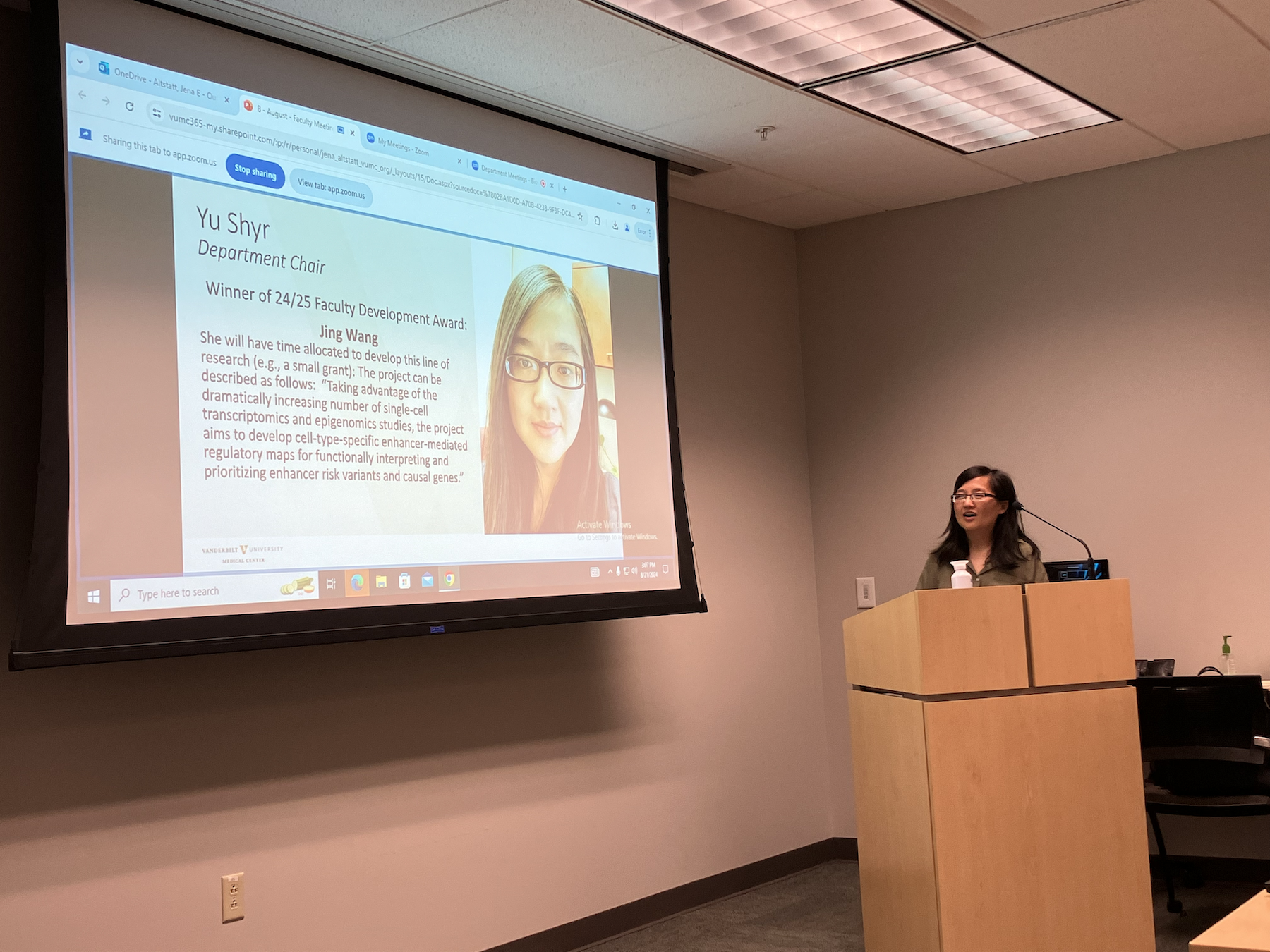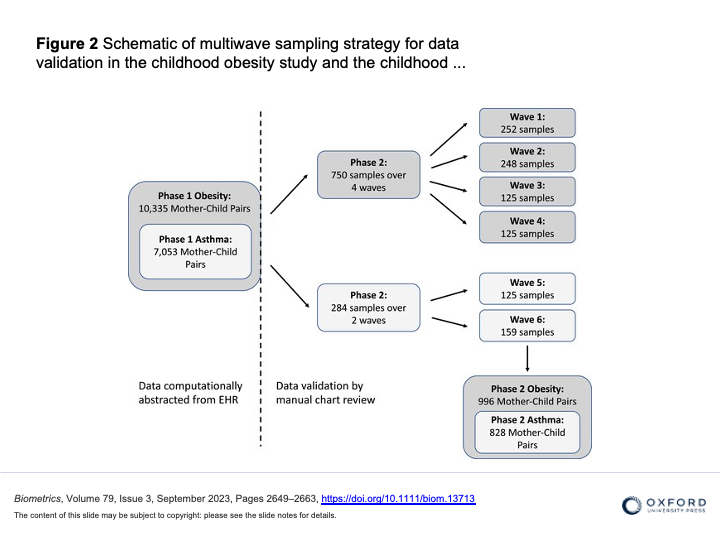Huiding "Eric" Chen wins ASA Student Paper Award
Congratulations to PhD candidate Huiding “Eric” Chen on the selection of “Synthetic Sampling Weights for Volunteer-Based National Biobanks: A Case Study with the All of Us Research Program” as one of five winning papers in the 2025 Student Paper Competition sponsored by American Statistical Association’s Consortium of Sections. The consortium consists of the ASA’s Government Statistics Section, Survey Research Methods Section, and Social Statistics Section. Papers entered the competition had to involve either a new statistical methodology or creative application of statistical analyses to a problem, issue, or policy question pertinent to the consortium’s subject areas.
As the author of a top student paper, Chen will receive a $1,000 stipend and present his work this August at a topic-contributed session during the 2025 Joint Statistical Meetings. One of the largest statistical events in the world, JSM is expected to draw more than five thousand attendees from over fifty countries to Nashville. Alumna Christina Tripp Saunders (PhD 2018), now a statistical scientist at Berry Consultants, was a winner of the GSS/SRMS/SSS competition in 2018.
Chen earned his Bachelor of Natural Science degree in statistics at Zhejiang University (Hangzhou, China), a top Chinese educational institution, followed by his master’s degree in biostatistics at Georgetown University. His dissertation advisor is Qingxia “Cindy” Chen, professor of biostatistics, biomedical informatics, and ophthalmology & visual sciences, and contact PI for the NIH-funded DARSaW project (Developing, Assessing, and Refining Synthetic Sampling Weights to Improve Generalizability of the All of Us Research Program Data). Huiding Chen has served as a data and quantitative analyst for All of Us since 2022, developing novel statistical methods to improve the weighting methods for non-probability sampling cohorts and leveraging Big Microdata from national surveys (e.g., PUMS, NHIS, NHANES) for calibration. His publications include “Evaluation of inpatient medication guidance from an artificial intelligence chatbot” in American Journal of Health-System Pharmacy (2023).

Methods and Publication Awards
Each year, our department produces, presents, and publishes hundreds of papers and software packages. We are pleased to recognize some of the best work from the past year:
 '
'
Left to right, top: Savannah Obregon, Cole Beck, Shawn Garbett, Onur Orun. Bottom: Bryan Blette, Shengxin Tu, Bryan Shepherd
The IT Innovation Award celebrates the creative and crucial contribution that IT members make to department operations, and to the research program within the department, across the medical center, and more broadly. The 2023 IT Innovation Award goes to application developer Savannah Obregon, senior application developer Cole Beck, and director of informatics software development Shawn Garbett for REDCapAPI: Interface to REDCap. The review panel commented that while the package was "initially conceived to export the raw API from REDCap into R, it has grown dramatically. Its features collectively ensure reliable and automated retrieval of REDCap data in a format that is ready for analysis." It is deserving of the award because it "provides a robust tool for researchers, aiding them in conducting efficient and effective research studies and is being used both inside VUMC and at institutions such as Meharry Medical College, Harvard Medical School, Children’s Hospital of Orange County, University of Colorado, Virginia Tech, Indiana and others."
The Linda Stewart Analysis Report Award recognizes an exceptional applied analysis report written by a staff biostatistician in our department. The winner of the 2023 award is Onur Orun, for a BRAIN-ICU long-term outcomes latent trajectory analysis report, co-authored by associate professor Rameela Raman. The judges for this award stated that "the report is extremely well polished, including high quality figures and tables combined with a thoroughly comprehensive view of the study with solid explanations of background and summary of results."
The Patrick Arbogast Collaborative Publication Award recognizes an exceptional collaborative publication from a biostatistician in our department. Assistant professor Bryan Blette received this award for "Is low-risk status a surrogate outcome in pulmonary arterial hypertension? An analysis of three randomised trials," which was published in The Lancet Respiratory Medicine (October 2023) with co-authors at Penn, Brown, Yale, and Cedars-Sinai. According to the judges, "This biostatistician first-authored paper provided convincing evidence for the invalidity of a widely accepted and used surrogate outcome in clinical care and trials. It serves as an outstanding example of how biostatisticians influence medical practice in a critical and positive manner."
The Methods Publication Award recognizes an exceptional methodological publication from a biostatistician or team of biostatisticians in our department. It was awarded to recent graduate Shengxin Tu (PhD, 2024) and professor Bryan Shepherd for "Rank intraclass correlation for clustered data," which was published in Statistics in Medicine (August 2023) with co-authors at University of Southern California and University of North Carolina. The judges wrote: "This paper introduces a novel rank-based approach to Intraclass Correlation Coefficient that enhances its robustness and applicability, showcasing a solid theoretical foundation and notable methodological creativity. The inclusion of real-world examples, comprehensive simulation results, and an accompanying R package heighten its practical value."
The winners receive personalized plaques and $200, and their names are added to the awards wall in the department, on the 11th floor of 2525 West End Avenue. The list of past winners is posted in the About section of this website.
We are immensely grateful to the faculty and staff who contributed their time and expertise to evaluating and discussing this year's entries. The panel was divided into separate committees for each award, with results relayed to an administrator who compiled and announced the results at the September All-Department Meeting. Judges did not participate on the committees of awards they were in contention for. This year's slate of volunteers:
| Gustavo Amorim | Bryan Blette | Hank Domenico | Svetlana Eden |
| Cathy Jenkins | Tatsuki Koyama | Jinyuan Liu | Trey McGonigle |
| Hui Nian | Laurie Samuels | Jonathan Schildcrout | Yaping Shi |
| Jing Wang | Shilin Zhao |
Jing Wang wins 2024 Faculty Development Award
Congratulations to research assistant professor Jing Wang, the 2024 winner of our department's Faculty Development Award. Her proposal was deemed the best in a field of highly competitive submissions for a one-year pilot grant. Dr. Wang will use this funding to support an investigation that she hopes to build into a larger project: “Taking advantage of the dramatically increasing number of single-cell transcriptomics and epigenomics studies, the project aims to develop cell-type-specific enhancer-mediated regulatory maps for functionally interpreting and prioritizing enhancer risk variants and causal genes.” Dr. Wang is shown here describing her project at the August 2024 faculty meeting, when the award was announced. Her accomplishments include first-authorship of a 2023 paper in Cancers (Basel) on small RNA profiling in human extracellular vesicles,

Biometrics paper of the year
Congratulations to professor Bryan Shepherd and principal biostatistician Aihua Bian on winning the 2023 Biometrics Best Paper Award, for "Multiwave validation sampling for error-prone electronic health records." The article was co-authored by Vanderbilt colleagues Shannon Pugh (Emergency Medicine), Stephany Duda (Biomedical Informatics), and William J. Heerman (Pediatrics), along with Kyunghee Han (University of Illinois at Chicago), Tong Chen (University of Auckland), Thomas Lumley (University of Auckland), and Pamela A. Shaw (Kaiser Permanente). The team used EHR data to "estimate the association between maternal weight gain during pregnancy and the risks of her child developing obesity or asthma." As the first known implementation of a multiwave sampling design, the study yielded several lessons learned and offers an R package (optimall) to address some of the data-handling chores:
First, adaptive sampling designs provide an important chance to recover from a poorly chosen first sampling wave. Second, we learned that it takes quite a bit of time between receiving validation data from one wave to design the next wave. Upon receiving validation data we needed to perform data quality checks, deidentify data, rerun FPCA analyses, refit regression models to estimate influence functions, recompute Neyman allocation, and then meet as a team to discuss whether and how to divide strata. Keeping track of interim data sets also became tedious. To alleviate some of these challenges we have developed an R package, optimall, which performs Neyman allocation, allows easy splitting of strata, and keeps track of various data sets in an efficient manner. This package also implements integer-valued Neyman allocation (Wright, 2017), which provides exact optimality for a fixed sample size (ie, avoids rounding issues) and was employed in later waves of our validation sampling.
The research was supported in part by PCORI award R-1609-36207 and NIH grants R01AI131771 and UL1TR002243.
This paper's team members are also the authors (with Vanderbilt Pediatrics and Nursing postdoc Nadia Sneed) of "Associations between gestational weight gain, gestational diabetes, and childhood obesity incidence," which appeared in the print issue of Maternal and Child Health Journal this month (following its initial e-publication in November). Drs. Shepherd, Shaw, and Duda are also known for their work on validating EHR data for HIV/AIDS research, which was recently recognized with a MERIT Award from the National Institute of Allergy and Infectious Diseases.

Schematic of multiwave sampling strategy for data validation in the childhood obesity study and the childhood asthma substudy. The numbers do not sum to 996 because of overlap of 38 records sampled for both the obesity and asthma studies. Figure 2 in Shepherd et al., "Multiwave validation sampling for error-prone electronic health records," © 2022 The International Biometric Society. https://doi.org/10.1111/biom.13713
Department Awards
Last month's all-department meeting included an award ceremony, during which vice chair of research Jonathan Schildcrout and graduate program director Robert Greevy presented the following honors:
The Linda Stewart Applied Analysis Report Award recognizes an exceptional applied analysis report written by a staff biostatistician in our department. The 2020 award was presented to Josh DeClercq for "Healthcare Costs and Utilization Project."
The IT Innovation Award recognizes exceptional work from a member or members of our IT team and potentially the team they work with. It celebrates the creative and crucial contribution that IT members make to department operations, and to the research program within the department, across the medical center, and more broadly. The 2020 award was presented to Cole Beck, Leena Choi, Elizabeth McNeer, Nathan James, Hannah Weeks, and Michael Williams, for the dose-building EHR (electronic health record) R package they authored.
The Patrick G. Arbogast Collaborative Publication Award recognizes an exceptional collaborative publication from a biostatistician or team of biostatisticians in our department. The 2020 award was presented to William D. Dupont and Dale Plummer for "8q24 Genetic Variation and Comprehensive Haplotypes Altering Familial Risk of Prostate Cancer," which was published in Nature Communications.
The Methods Publication Award recognizes an exceptional methodological publication from a biostatistician or team of biostatisticians in our department. The 2020 award was presented to Ran Tao for "Optimal Designs of Two-Phase Studies," which was published in Journal of the American Statistical Association.
The Distinguished Teaching Assistant Award, recognizing excellence in teaching and a dedication to peer education, was presented to Yan Yan.
The W. S. Gosset Award for Exceptional Research, recognizing exemplary work that will advance the field and impact of biostatistics, was presented to Yuqi Tian.
The Commodore Award in Biostatistics was presented to Coleman Harris in recognition of his altruistic dedication to enriching the department and graduate program.
The Outstanding Faculty Mentor Award, recognizing excellence in dedicated mentoring, with an altruistic commitment to student learning beyond the classroom, was presented to Simon Vandekar.
The Golden Apple Award for Excellence in Teaching was presented to Andrew Spieker in recognition of his altruistic commitment to student classroom learning.
There were many outstanding nominees, and we thank the judges: Dan Ayers, Svetlana Eden, Shawn Garbett, Robert Greevy, Frank Harrell, Bob Johnson, Orun Onur, Dale Plummer, Jonathan Schildcrout, and Matt Shotwell.
We will be sharing news of more awards in a few days. Stay tuned . . .
